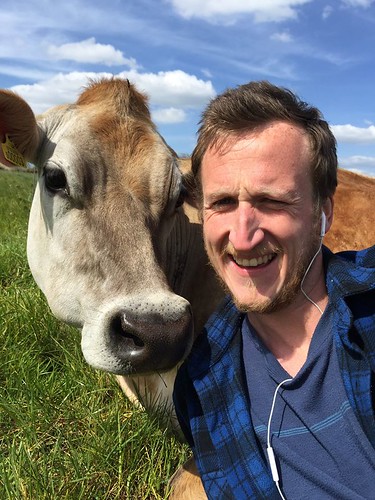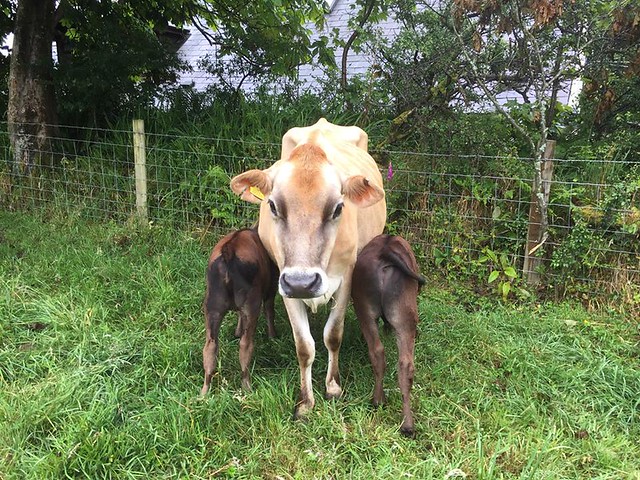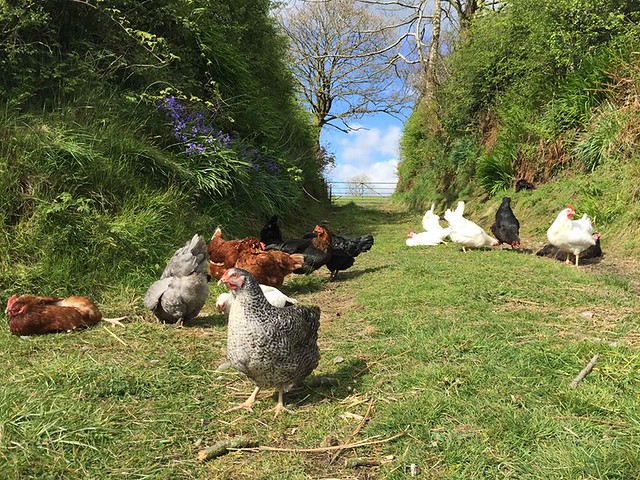First published on Medium on 8/10/17
 Alex Heffron of Mountain Hall Farm looks at the fundamentals of permaculture, using David Holmgren’s Permaculture: Principles and Pathways beyond Sustainability as a guide for discussion
Alex Heffron of Mountain Hall Farm looks at the fundamentals of permaculture, using David Holmgren’s Permaculture: Principles and Pathways beyond Sustainability as a guide for discussion
There’s a bit of a trend amongst the old-guard of the organic movement to write off permaculture as some sort of modern, utopian fad — one author I greatly respect called it a ‘distraction’. Largely these criticisms are based on condemnation before examination, so in this series of posts I am going to explore the core of what permaculture is, from the standpoint of its ethics and principles, in a more philosophical manner. The criticism sometimes made of permaculture is that it’s just a set of fanciful theories, and isn’t grounded in practicalities — there’s some truth to that — but is that a fair criticism of permaculture itself as it ignores the thousands of people for whom permaculture is a catalyst and guiding theory for the practical work they do, whether that’s setting up urban growing projects, CSAs, permaculture-inspired farms, creation of eco-villages, or the other myriad projects that permaculture inspires.
I won’t go into all the specific design aspects, which is equally as much permaculture as the principles and ethics, because my mind isn’t that well suited for visual design work, instead working better in a linear, word-based format. For this discussion I’m going to use my favourite book from the permaculture movement, David Holmgren’s Permaculture: Principles and Pathways Beyond Sustainability. For me it’s one of the quintessential books on permaculture, giving a breadth of overview combined with depth of knowledge. Holmgren is the co-originator of permaculture along with Bill Mollison. Clearly permaculture didn’t begin in a vacuum, it was influenced by many of the waves of thought of the day, but I’m not so interested in exploring the origins of permaculture in these pieces, as I’d like to get stuck into the notions put forward by Holmgren, in what’s for me, one of my favourite books. I’ll also contrast at times with Bill Mollison’s Permaculture: A Designer’s Manual.
So in essence this will be a long-form discussion of what interests me about permaculture. Along the way it will shed some light on it for those that don’t know about it, and for those that do, it will hopefully raise points for consideration.
NB — this is just my perspective, it’s not a definitive discussion! There are many other aspects of permaculture that can highlighted as equally relevant.
What is permaculture?
Stated simply by Mollison and Holmgren in Permaculture One:
"Consciously designed landscapes which mimic the patterns and relationships found in nature, while yielding an abundance of food, fibre and energy for provision of local needs."
A useful point made by Holmgren is that:
"Permaculture is not the landscape, or even the skills of organic gardening, sustainable farming, energy efficient building, or eco-village development as such. But it can used to design, establish, manage, and improve these and all other efforts made by individuals, households and communities towards a sustainable future."
He also says about ‘permaculture as counterculture’, and this I think is particularly relevant to the debate between the old-guard of the organic movement, and the newer wave more likely to be influenced by permaculture:
"As such, permaculture has provided a wholistic framework for reorgansiing the lives and values of a small minority ready for more fundamental change. This has been particularly so for the minority of young people disillusioned with the conservative consumer youth culture of the late twentieth century."
I don’t think that can be underestimated. When people get lost in arguments about annuals vs perennials, this driving force of why permaculture has been so inspiring for so many is lost. When you’re surrounded by neo-liberalism permaculture is a breath of fresh air. Not because it says anything particularly new in the historical sense, but because it brings it all together under one umbrella and under one roof. For those of us, like myself, it gives us a sense of collective belonging and allow us to feel more confident in building our alternative (to the dystopian conventional option) futures. There is a criticism of permaculture that it has ‘appropriated’ its principles and practical applications from a wide variety of other methodologies and practices — that’s true but so what? Does it really matter? Permaculture acts as a gathering place for those methodologies, helping to bring some coherence and underlying principles to them. Equally so, that doesn’t mean that permaculture is exhaustive.
 Finally, one of the simplest aims of permaculture, on top of what’s been said, is that it’s about building closed loop system, as best as possible. The output from one aspect of any farm should be the input for another aspect of it. So the dairy cow not only provides milk and meat, but also fertility for the garden. That could be dismissed as being obvious — but so often these days, these obvious, common sense relationships have been broken, meaning that instead the rich manure from a dairy cow, instead of being a beneficial source of nutrients becomes a potential environmental hazard. Which ties us into another aspect permaculture considers, one of scale, but we’ll come to that in a later post.
Finally, one of the simplest aims of permaculture, on top of what’s been said, is that it’s about building closed loop system, as best as possible. The output from one aspect of any farm should be the input for another aspect of it. So the dairy cow not only provides milk and meat, but also fertility for the garden. That could be dismissed as being obvious — but so often these days, these obvious, common sense relationships have been broken, meaning that instead the rich manure from a dairy cow, instead of being a beneficial source of nutrients becomes a potential environmental hazard. Which ties us into another aspect permaculture considers, one of scale, but we’ll come to that in a later post.
The three ethics
Permaculture has three guiding ethics; People Care, Fair Share and Earth Care — or at least this is how they’ve become popularised over time. The original ethics, outlined by Bill Mollison, went along the lines of; Care of the Earth, Care of People, and Setting Limits to Population and Consumption.
I think it’s worth considering the difference between the popularised version of ‘Fair Share’ and ‘Setting Limits to Population and Consumption’ — there is a difference there, and it’s not that subtle. It specifically names ‘limits’ — not a concept we’re particularly fond of in our modern culture. Fair Share as a concept can be abused and stretched far more than the starker ethic of ‘setting limits to population and consumption.’ I’d suggest that building limits into our systems is healthy and necessary. If the prophecies of the Limits to Growth report, published in the 70s, had been heeded, then we wouldn’t currently be going through climate change, and the systemic failure of our economic-political system. Fair Share, is a more ambiguous term, because who defines fair?
Mollison goes on to say:
"A basic question that can be asked in two ways is:
“What can I get from this land, or person?” or “What does this person, or land, have to give if I co-operate with them?” Of these two approaches the former leads to war and waste, the latter to peace and plenty."
This for me elucidates the core of permaculture. It’s about asking the land, and people, and wildlife, what they have to give if we act co-operatively. That shouldn’t be considered a ‘romantic illusion’ — it’s entirely possible, feasible and realistic to act in this manner. In fact, it’s the only long-term manner in whch we can act that doesn’t turn the world into a Blade Runner-esque dystopia. It’s about working with nature, not against it. Perhaps we can also say it’s about regeneration, not extraction.
On a different note he says:
"The only ethical decision is to take responsibility for our own existence and that of our children."
That’s a very simple, and yet quite powerful dictum. Ok if you dwell on it further, you could claim its too anthropocentric to use on its own, and I would agree, but let’s not take it out of context, permaculture has in its roots a respect for nature, in and of its own self.
But this personally-focused, bottom up approach that permaculture takes is one of its core strengths. It’s akin to ‘be the change you want to see’ — it empowers us to take action, and stop looking to our ineffectual, and corrupt governments to do so. It doesn’t say not to campaign for top-down change, it just says start with yourself, and then if you’re so inclined, campaign and form political alliances. The environmentalist movement has got stuck on this, highlighted by Kevin Anderson’s piece Hypocrites in the Air, in his usual clear and blunt manner.
David Holmgren too very much walks the walk and says:
“[It] requires that I first recognise and act on my responsbilites and change myself before pointing the fingers at others, or at least while concurrently doing this.”
 It’s an argument for maturity. Notice that last emphasis. He’s not saying we mustn’t campaign for wider systemic change, he’s just saying take respsoniblity for yourself. It’s hypocritical to do otherwise. This line is sometimes criticised, saying that it’s making it too personal, that it falls foul of our cult of the individual — we’re just one person, it’s the system, not us etc. Whilst there is some truth to that line of argument it does not preclude that you yourself must change nor that you can do both. It also ignores the power of humans to influence each other.
It’s an argument for maturity. Notice that last emphasis. He’s not saying we mustn’t campaign for wider systemic change, he’s just saying take respsoniblity for yourself. It’s hypocritical to do otherwise. This line is sometimes criticised, saying that it’s making it too personal, that it falls foul of our cult of the individual — we’re just one person, it’s the system, not us etc. Whilst there is some truth to that line of argument it does not preclude that you yourself must change nor that you can do both. It also ignores the power of humans to influence each other.
Du mußt dein leben ändern, as famously put by Rilke, you must change your life.
The fourth ethic
I’m going to be so bold as to suggest a fourth ethic, specifically for those keeping livestock. Animal Care. To me the three former ethics don’t cover this. Earth Care represents wildlife more than it does our domesticated animals. It’s perfectly possible to satisfy the three former ethics, yet keep our animals in conditions that are sub-standard; I’ve seen it myself on a permaculture-inspired farm. Ethically-speaking I feel it’s incumbent on us to consider the domesticated animal’s welfare as equal and paramount.
Systems thinking not reductionist thinking
In a forthright statement David Holmgren says:
"Through [reductionism] we have achieved much. But, despite the hubris about new contributions to humanity’s well-being, I believe reductionist science is now an impediment to human survival."
This is close to the core of what permaculture is all about. It’s about thinking about what, how and why we do something — in the broadest sense. Living as we have within a reductionist mindset for the last 300 years or so, we’ve progressively lost the ability to think systemically/holistically. Nowhere is this more apparent than within farming where the prevailing logic seems to be bigger is always better. Why farm 100 acres, when you can farm 1000 acres with modern machinery. Why use muscle power when you can use a big machine? The justification for this is the suspect concept of ‘efficiency’ — the holy grail of modern society borne out of our obsession with hyper-rationalism. Logics and facts must always be right, obviously.
He talks of reductionism threatening humanity’s survival; words I do not consider an over-statement. If one knows Holmgren’s work they will appreciate better that this is a man with tremendous ability for rational thinking, but he also appreciates the limits of the rational mind. Something that culturally we’re struggling to grasp, though increasingly awakening to. It’s ironic that Voltaire and his contemporaries put forward rational thinking as a means of freeing people from the tyranny of the religious state of the 18th century — a rational method which is now increasingly being used to subjugate people, just as the church once did. The irony would not be lost on Voltaire. As John Ralston Saul says in Voltraire’s Bastards; The Dictatorship of Reason in the West:
"Never have so few people been willing to speak out on important questions. Their fear is tied not to physical threats, but to standing apart from fellow experts or risking a career or entering an area of nonexpertise. Not since the etiquette-ridden courts of the 18th century has public debate been so locked into fixed positions, fixed formulas and fixed elites in rhetoric."
 This is a relevant digression, so indulge me. Both Mollison and Holmgren have railed against neo-liberalism and hyper-reductionism. They’re not suggesting reductionism is bad per se, like most things it has its niche, but like humans it’s overstepped it. Rationalism is predictably ending where it started in the suppression of creativity, freedom and dissent. The rise of populism and the rejection of ‘experts’ is in part a reaction to this. The response of our cultural, economic and political institutions so far has been to double-down on its assertion of the superiority of facts and logic, above all else.
This is a relevant digression, so indulge me. Both Mollison and Holmgren have railed against neo-liberalism and hyper-reductionism. They’re not suggesting reductionism is bad per se, like most things it has its niche, but like humans it’s overstepped it. Rationalism is predictably ending where it started in the suppression of creativity, freedom and dissent. The rise of populism and the rejection of ‘experts’ is in part a reaction to this. The response of our cultural, economic and political institutions so far has been to double-down on its assertion of the superiority of facts and logic, above all else.
Holmgren warns against a coming rejection of science saying:
"The development of a truly wholistic science is important; otherwise we will see a wholesale rejection of the culture of science in the new millennium as it increasingly fails to explain and predict the novel phenomena of energy descent."
Energy descent is a topic we’ll come to in a later post, as it’s also key to understanding permaculture and what pits it against ecomodernism.
Permaculture asks us to question what we do, and asks us to think about why and importantly gives a framework for doing so, trying as best as possible to mimic nature. So many of our problems stem from putting something in the wrong place, or taking something away that should really be there. Let us flooding as an example. We’ve built thousands of houses on floodplains, and then get annoyed when they flood. Then to exacerbate the problem we’ve deforested so much of the uplands, and degraded so much soil, that low lying areas that were once resilient are now suffering from flooding. You shouldn’t need permaculture to point that out, yet still this continues. As I said, 300 years of reductionism has meant we now can’t see the wood for the trees.
To conclude, permaculture, roughly-speaking is:
- Applied systems thinking — using nature and conscious ecological design as a guide and framework for building genuinely sustainable and resilient systems — be they gardens, farms, houses, communities, economies, or policies.
- The development of closed-loop systems, minimising external inputs wherever possible.
- A social counter-cultural movement. It’s radical, in the truest sense of the word of going against the conventional and challenging the status quo.
Founded on a simple system of ethics and principles that guide decision making.